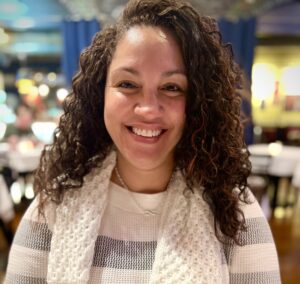Dorma Liz Davila (Lizzy) RN, BSN, CPN, EMT never expected a quick volunteer weekend as a camp nurse to provide a transformative experience, but it did. And now she wants other nurses to know how helping kids at Paul Newman’s The Hole in the Wall Gang Camp can breathe new life into their nursing careers. 
The Hole in the Wall Gang Camp is an organization that provides what the organization calls “a different kind of healing” to thousands of seriously ill children and family members every year. The campers attend completely free of charge and are cared for by the skilled nurses who volunteer in the infirmary for a weekend, a week, or more.
Davila, who works as a pediatric critical care transport nurse, first volunteered last year when a colleague who works as a camp nurse there told her they needed nurses for the Spanish-speaking family weekend. Her colleague had talked about how much she enjoyed being a camp nurse there, so Davila decided to give it a try. But she didn’t really know what to expect.
The first day, Davila got a crash course in the facility, the campers and their conditions, the equipment she’d need, and that was before even meeting all the new campers. But it didn’t take long for her to feel something she didn’t expect. “The first time I went I just fell in love,” she says. “It is like no other job. It’s just completely different.” Davila’s feeling from that one weekend spurred a commitment to future work, and she will also participate as a camp nurse this summer. “I got hooked,” she says. “I said ‘I am your Spanish weekend nurse.'”
The biggest surprise for Davila was how joyful the camp experience is and how much fun she had personally. As a transport nurse, Davila sees patients at their worst, she says. So coming to the camp, she was able to see the kids just having fun, building relationships, and having some freedom, despite their illnesses. And she says it’s also different from working as a bedside nurse with the associated stress of potentially having too many patients or caring for patients in a rushed environment.
While Davila provides support and is there for medical emergencies, during the Spanish weekend, families come with their children and provide the usual medical care they provide at home. “I am there as a nurse, but I am also with them doing arts and crafts or meeting them at the tower for the zip line,” she says. “It’s almost like I am a camper. It’s not like I am on the sidelines.” And while she’s working with the children, she’s also working with the families who appreciate the support and camaraderie of the medical staff and the other families.
Davila didn’t attend camp as a child and was curious about what it would be like. What she found as an adult was an experience that struck a sensitive chord. The campers’ families and caregivers often talk about how the children are teased in school by other kids who don’t understand their medical needs or equipment they must use. At the camp, the feeling of pure acceptance is something Davila felt personally–and it affected her profoundly.
“To go to the camp and see these kids laughing and smiling and there are no kids picking on them,” she says. “At camp, no one puts anyone else down.” As a Latina nurse born and raised in Puerto Rico, Davila says feeling different or other, something that happens in the real world, was entirely absent at the Hole in the Wall Gang Camp. “I came home and said this was a fairy tale world within the real world,” she says. “It’s like a bubble.”
Davila encourages other nurses with pediatric backgrounds and training (particularly training in emergency medicine or urgent care (pediatric or adult), pediatric intensive care, pediatric hematology/oncology, pediatric metabolic/mitochondrial disease, and pediatric immunology) to consider working at the Hole in the Wall Gang Camp or one like it. As overwhelmingly positive as it is to see the campers truly bloom during the weekend, Davila says the staff are impacted as well.
“I wish I could have people experience this,” she says. “It was therapeutic for me too. I recommend this to all nurses.”
- A Camp Nurse Volunteer Shares the Joy - April 30, 2024
- Is the FNP Program Right for You? - April 24, 2024
- WOC Nurses Week Highlights Specialty - April 16, 2024


